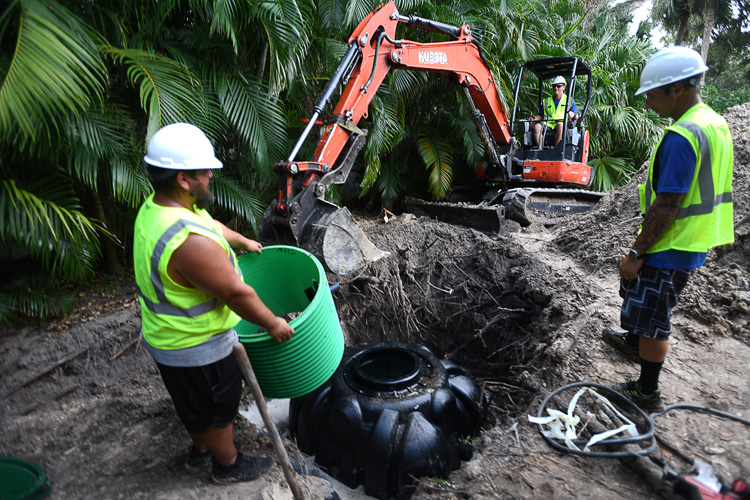Time is running out for roughly 500 homeowners on the barrier island who still have septic systems to comply with the law and then decide whether to hook up to sewer service through Vero’s hybrid STEP system, with possible incentives and financing from the City of Vero Beach.
After Jan. 1, island homeowners within Vero city limits who have failed to provide written proof that they have had their septic tank pumped out and it passed inspection could be subject to code enforcement fines. The long-term goal of the city is to phase out septic systems entirely over time, but for now, to at least make sure existing tanks are functioning properly.
The innovative Septic Tank Effluent Pumping (STEP) system allows the homeowner to keep a septic tank in place, but pairs the tank with a pump that removes the liquid portion of the waste or effluent to prevent tank failure, and to reduce the leaching of raw sewage into groundwater that flows into the Indian River Lagoon.
The lagoon has suffered severe ecological damage in recent years from algae blooms fed by nitrogen and phosphorous, with leaky septic systems identified as a major culprit in the contamination.
“Right now, our ordinance requires that all septic tanks in the City of Vero Beach be pumped out and inspected prior to Dec. 31 of this year,” City Manager Monte Falls said. The city will be sending out reminder letters to residents who are not yet in compliance.
Falls said island residents are more aware of the STEP system option, in part because the city has conducted neighborhood meetings to promote the system, which can be installed in conjunction with the required inspections and pump outs. “The STEP systems have been more popular there [on the island] because we’ve been able to have the meetings with residents,” Falls said.
Falls said similar meetings planned for mainland residents did not take place, in part due to COVID-19 pandemic restrictions on group gatherings. He said he recommended leaving the Dec. 31 deadline in place for the island, while extending the deadline for mainland residents two years to the end of 2022.
“If you have a pump out and the inspection fails, you cannot replace the tank or the drainfield. You have to connect to the system,” Falls said. “That’s the way the ordinance is written.”
One of the first areas where STEP was rolled out was the Bethel Creek neighborhood in Central Beach. Then the Live Oak, Riomar and South Beach areas were phased in. So far, about 400 barrier island homes have contracted with Vero Beach Utilities to hook up to sanitary sewer lines via the STEP system out of 900 septic systems on the island, Vero Utilities Director Rob Bolton said.
Roughly 50 out of 400 city homeowners on the mainland with septic systems have connected with the STEP system.
The costs of hooking up to the STEP system vary, but typically run between $4,000 to $6,000. At the outset of the program, the city offered incentive programs with credits effectively waiving the impact fee for paying cash or offering financing with affordable payments over a 10-year period.
Bolton said he’s had numerous requests to bring back the incentive program for island residents who are now up against the year-end deadline. Staff will present the City Council with options for new or renewed incentives in the coming weeks.
Falls pointed out that even if the law permitted homeowners to replace a failed tank and drainfield, that job would cost $5,000 to $9,000. STEP system costs are comparatively lower in most cases.
Island residents have until Dec. 31 to submit an application to have inspection and pump out completed; after that, they can apply to the city for a STEP system to make sure installation is feasible.
In 2021, the focus of the pump outs, inspections and STEP program hookups will shift to neighborhoods on the mainland that still have septic tanks. The city provides engineering services and help with planning residential conversions, but homeowners must hire a contractor from an approved list of companies with personnel trained to install the STEP system.
Falls said the city has quite a few extremely old septic systems that do not meet today’s code, including some that don’t even have bottoms to the tanks. Council members praised Bolton for having great success with getting the STEP system permitted by state officials, and for the impact that getting hundreds of septic systems hooked up to sewer service has on the health of the lagoon.
Hooking residents up to the STEP system has a twofold benefit to the city, as it helps Vero meet state regulatory requirements for reducing nitrogen pollution and also brings in new revenue as the sewer customers then pay monthly utility bills to the city to defray the fixed costs of operating the whole wastewater system.

